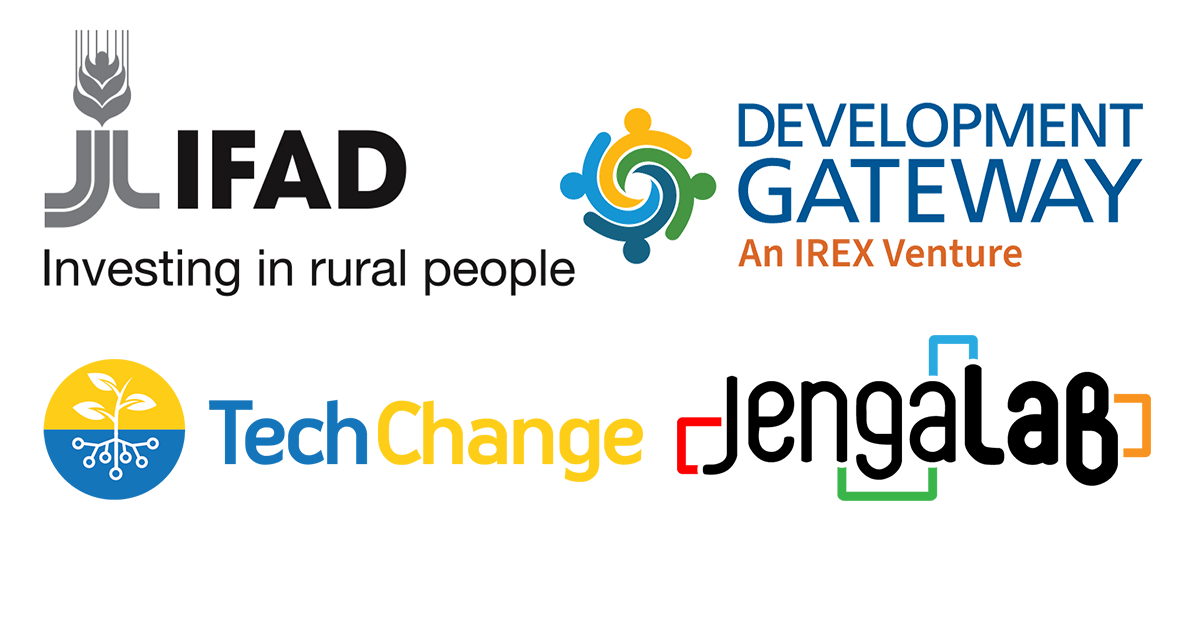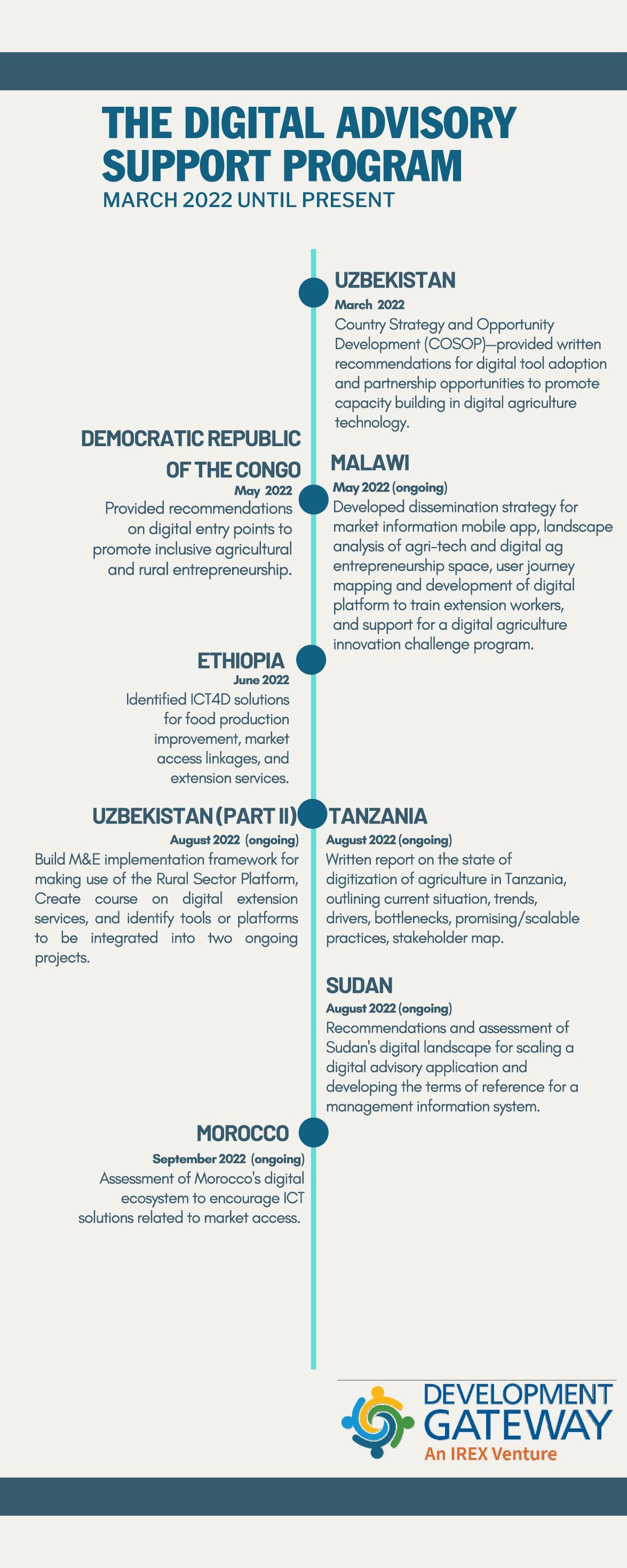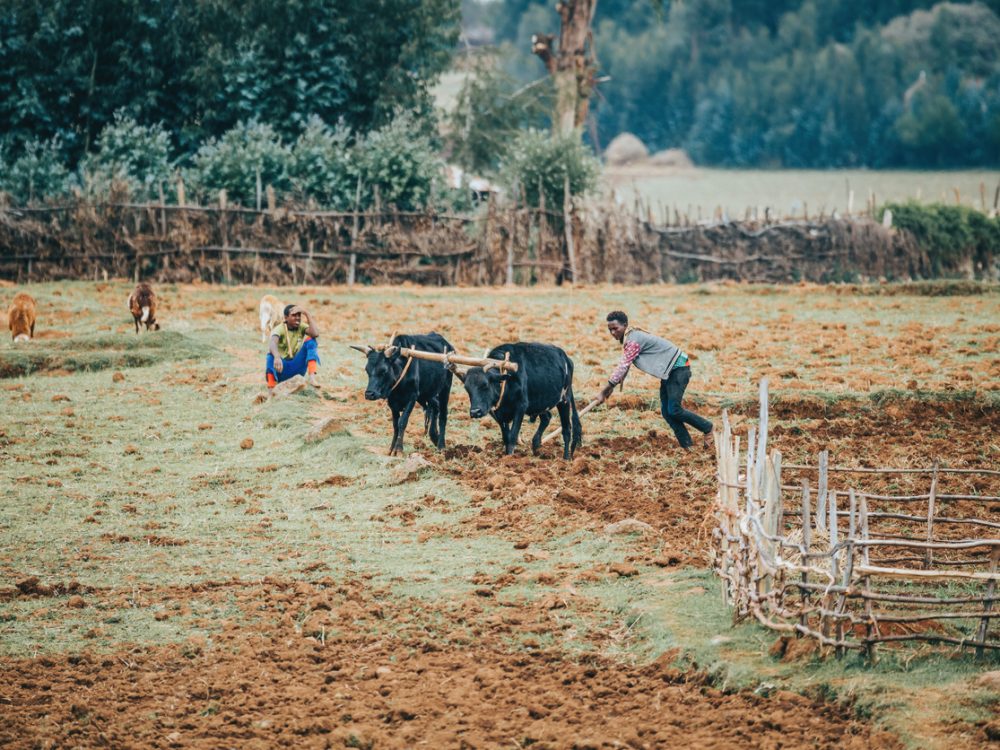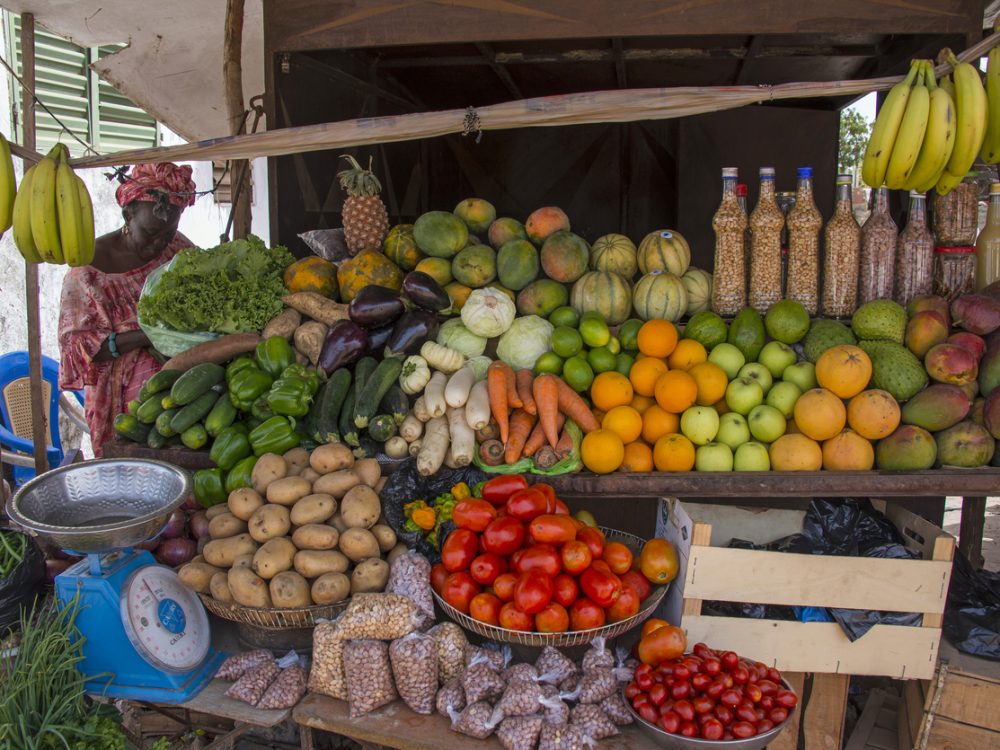Launching: Digital Advisory Support Services for Accelerated Rural Transformation (DAS)

The Digital Advisory Support Services for Accelerated Rural Transformation (DAS) Program launched in March 2022 and will go through March 2025. Development Gateway: an IREX Venture (DG) will implement the grant in partnership with Jengalab and TechChange to advance Information and Communication Technology for Development (ICT4D) in the agricultural sector across Africa, the Middle East, and Central Asia.
Enhancing food security and increasing crop production is a daunting challenge. Change requires all elements of the food system – production, monitoring, distribution, and quality assurance – to work together synergistically, supporting and underpinning each other. It also requires a direct focus on the needs of farmers.
Small farms account for 84 percent of farms worldwide and produce 35 percent of the world’s food supply.1 Despite the huge role of smallholder farmers, they face significant challenges to scaling their production (i.e., producing a higher crop yield and/or increasing quality products ready for market). From weak institutional support, poor infrastructure, lack of access to capital, and beyond – these challenges can affect agricultural productivity.
Meeting the Digital Needs of Farmers
Digital and Information and Communication Technology (ICT) tools are one path forward. For example, a smallholder farmer in Malawi, who can access a line of credit through a mobile application, could use this funding to purchase seeds and fertilizer before the growing season begins. The same farmer can also use a mobile device to access information on weather forecasts, market research, planting techniques, financial tools, and other agricultural information. This type of information is crucial for a farmer making decisions in order to improve productivity and provide a buffer from unforeseen challenges during the growing cycle.
Increasing smallholder farmers’ access to digital tools is an opportunity to support smallholder farmers while creating more resilient food systems. In the process, partner organizations, government agencies, and civil society organizations (CSOs) can identify successes and good practices for connecting farmers to critical information. Doing so, can help build better targeted programs that improve the ability of program implementers to target, monitor, and measure the impact of digital solutions that support farmers – and create useful feedback loops for continual learning and growth.
Program Background and Goals
In March 2022, DG launched the Digital Advisory Support Services for Accelerated Rural Transformation (DAS) Program, through funding from the International Fund for Agricultural Development (IFAD),to address the gap in digital tools and information access for smallholder farmers. Through rapid advisory deployments, the DAS Program will focus on two main objectives:
- Increase access to information and inclusive financial services for smallholder farmers and partners they work with, including extension workers, and
- Increase the use of ICT4D solutions to achieve better targeting, monitoring, and impact measurement for agricultural development.
DG is partnering with digital development experts, Jengalab, and digital training creator, TechChange, to provide a holistic approach to advisory support. Jengalab will lead and contribute to ecosystem and M&E assessments, while TechChange will create customized training for implementing partners. DG will also work closely with the two program partners to develop and disseminate good practices that can support capacity building around the use of ICT in agriculture programs for IFAD-financed implementers across the geographic regions.

Advisory Support: Our Approach
The DAS Program is a demand-driven facility, meaning IFAD-financed implementing partners can approach the program for tailored support on integrating digital technology solutions into existing programs, new program designs, and institutions.
The program offers a menu of options for requesters to choose from including, but not limited to:
- Ecosystem assessment and mapping for country strategies, development plans, supply chains, or specific sectors;
- Digital tool appraisal to map user journeys, user experience, scalability, and sustainability;
- Establishment and documentation of data governance procedures to support digital tool management;
- Integration of ICT technology indicators into the project, program, or strategy M&E results frameworks;
- Capacity and awareness building of target institutions, government, and implementing partners via customized training;
- Support in the development of a Request for Proposal/Terms of Reference/Scope of Work to engage an ICT service provider; and
- Research brief on specific ICT topics (e.g., the use of algorithms, machine learning, data protection factors, etc.).
Recognizing the need for a customizable, flexible approach to providing support, DG, Jengalab, and TechChange developed the menu of options to address the variety of challenges, as well as opportunities, that programs face in embedding digital tools within existing agricultural ecosystems. The goal overall is to tailor the options to each team’s particular needs, integrating the expertise of the partners into a package of advisory support that both builds team capacity and creates opportunities to document learnings that other teams can benefit from in the future.
Building digital tools is not just an opportunity to improve agricultural processes, it’s also a chance to share lessons learned with the wider ICT4D community. The DAS Program aims to inform future ICT4D best practices and implementation strategies by creating toolkits, guides, case studies, and cross-learning events to share what works and what does not for ICT4D innovations. DG will develop a digital knowledge hub to allow the public to access the collection of resources and guidance developed under the program.
Next Steps
The DAS Program has engaged with partners in Uzbekistan, Ethiopia, Democratic Republic of the Congo, and Malawi since its inception in March 2022. In the upcoming months, the Program will provide advisory support in Sudan, Uzbekistan (as a follow-on request), Morocco, Nigeria, and Burundi, with additional countries to be determined.
We look forward to sharing what we learn in the process as the DAS Program gains speed. Stay tuned!
1. Lowder SK, Sanchez, MV & Bertini, R. Which farms feed the world and has farmland become more concentrated? World Dev 2021; 142. https://doi.org/10.1016/j.worlddev.2021.105455.
Share
Recent Posts

Supporting Ethiopia’s National Soil Fertility and Health Action Plan
Declining soil fertility remains a major constraint on Ethiopia’s agricultural productivity. This blog reflects on the launch of the National Soil Fertility and Health Roadmap and DG’s support in its development, highlighting lessons on government-led reform and long-term resilience.

Development Gateway Collaborates with 50×2030 Initiative on Data Use in Agriculture
Development Gateway announces the launch of the Data Interoperability and Governance program to collaborate with the 50x2030 initiative on data use in agriculture in Senegal for evidence-based policymaking.

Strengthening Online Safety Through Prevention in the Philippines
Tech-Facilitated Gender-Based Violence continues to evolve alongside emerging technologies. This blog explores how preventative measures, such as the Safety By Design approach, can be used to create a safer internet.